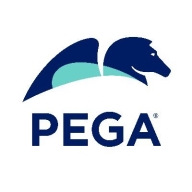

Pega Platform and Oracle BPM are prominent contenders in the Business Process Management category. Pega appears to have an edge due to its low-code environment which enhances rapid development and flexibility.
Features: Pega Platform is distinguished by its strong case management, ease of integration, and cloud services which allow for quick deployments while maintaining system integrity. Its low-code environment is favored for enabling rapid development and adaptability. Oracle BPM excels with its robust BPMN 2.0 standards, tight integration with Oracle's SOA platform, and comprehensive metrics reporting capabilities, offering a powerful solution for complex service and application integration.
Room for Improvement: Pega users face challenges with its complex licensing model and high costs, along with the need for better cloud presence and AI/ML enhancements. Some users find the customization requires more specialization, which conflicts with the low-code promise. Oracle BPM is criticized for its intricate tool structure and high cost, needing better support for containerization and cloud-native technologies.
Ease of Deployment and Customer Service: Pega Platform offers flexible deployment options including public cloud, private cloud, and on-premises configurations, though this adds complexity. Customer service experiences vary; some users appreciate the support while others see room for improvement in response time. Oracle BPM, typically deployed on-premises, also provides hybrid cloud options. Its technical support, though knowledgeable, is sometimes perceived as slow, particularly with unique or complex issues.
Pricing and ROI: Both Pega Platform and Oracle BPM are regarded as expensive solutions. Pega's variety of licensing models fits large enterprises but may not be cost-effective for SMEs. Despite the high cost, Pega is noted for substantial ROI through enhanced efficiency and expedited development. Similarly, Oracle BPM’s comprehensive features and integration capabilities justify its premium price for some, though it might not align with all budgets. Both platforms deliver tangible ROI, reinforcing their value despite high pricing.


Pega Platform facilitates business process management, case management, and workflow automation for industries like banking, insurance, and healthcare. It supports digital transformation and customer service enhancements with its low-code capabilities and seamless integrations.
Pega Platform enables users to create efficient systems for case management, financial operations, and digital transformations. It provides tools for client onboarding, quoting, claims processing, customer experience improvements, and content management. Pega's low-code approach allows for the automation of complex processes, making it suitable for enterprises looking for adaptability and rapid deployment. While it offers strong real-time analytics and decision automation, users acknowledge challenges in user interface, integration, and performance aspects. High costs and a learning curve need attention, and enhancements in AI features and cloud services are desired.
What are the key features of Pega Platform?In banking, Pega Platform automates loan processing, accelerates customer onboarding, and manages compliance. Insurance companies benefit from streamlined claims processing and policy management. Healthcare sectors use the platform for patient engagement and care coordination, enabling organizations to adapt quickly to changing industry requirements.
We monitor all Business Process Management (BPM) reviews to prevent fraudulent reviews and keep review quality high. We do not post reviews by company employees or direct competitors. We validate each review for authenticity via cross-reference with LinkedIn, and personal follow-up with the reviewer when necessary.